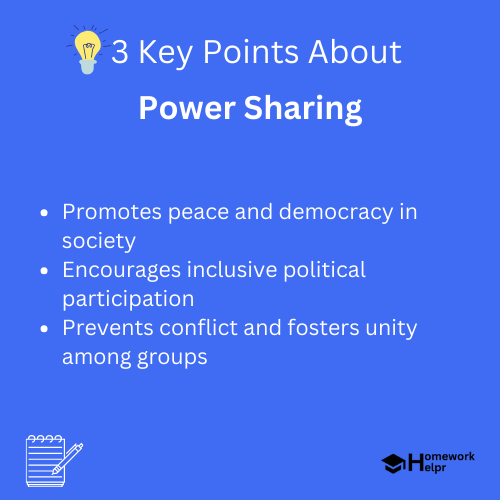📝 Summary
Power sharing is a crucial governance principle that ensures different groups have a voice in decision-making, maintaining peace and promoting inclusion. It involves distributing authority and resources among communities, preventing dominance by any one group. Key types include federalism, consociationalism, and power-sharing agreements, each fostering cooperation in diverse societies. The significance of power sharing lies in preventing conflict, promoting unity, and encouraging participation in politics. While it faces challenges such as inflexibility and corruption, it is vital for a stable and representative governance system. YMCA community support for empowerment is essential for shaping diverse communities.
Understanding Power Sharing
Power sharing is a fundamental concept in governance that ensures that different groups within a society have a voice and a role in decision-making. This principle is critical in maintaining peace, promoting inclusion, and fostering democracy. It is particularly vital in countries with diverse populations composed of various religious, ethnic, or linguistic backgrounds. In this article, we will explore the types, significance, and examples of power sharing, particularly focusing on its impact on society.
What is Power Sharing?
Power sharing refers to the distribution of authority, responsibilities, and resources among multiple groups within a political system. Instead of concentrating power in one singular group, it promotes a more equitable method of governance that acknowledges the interests and rights of various communities. This ensures that no single group dominates political processes, allowing for a more balanced representation of the populace.
Definition
Equitable: Fair and impartial, ensuring that all individuals or groups have their rights upheld.
Types of Power Sharing
Power sharing can be classified into several categories, each of which plays an essential role in fostering a cooperative political environment. Below are the main types:
- Federalism: This involves dividing powers between different levels of government, such as national and state governments. For instance, in the United States, powers are shared between federal and state governments, allowing local governance that reflects the local populace’s needs.
- Consociationalism: This type entails a form of governance where representatives from different groups share power collectively. It is commonly seen in countries like Belgium and the Netherlands, where various linguistic communities have a voice in governance.
- Power-sharing agreements: In some cases, political parties may engage in agreements that allow them to share political power, especially after conflicts. For instance, the power-sharing agreement in Nepal helped to stabilize the country after years of civil unrest.
Importance of Power Sharing
The necessity of power sharing in a diverse society cannot be overstated. Here are some key reasons why it is essential:
- Prevention of Conflict: By ensuring that no particular group monopolizes power, power sharing helps to mitigate tensions that could lead to violent conflicts. It provides a platform for dialogue and cooperation among diverse communities.
- Promoting Unity: It fosters a sense of belonging and unity among different groups in society, leading to more cohesive communities. When people feel represented, they are more likely to work together for common goals.
- Encouraging Participation: Power sharing invites wider participation in politics. When members of different groups feel their voices matter, they are more likely to engage in the political process, enhancing democracy.
Examples of Power Sharing
Power sharing can be seen in various nations around the world, serving different cultural and political needs. Here are a few illustrative examples:
- Belgium: Belgium employs a consociational approach where power is distributed between Dutch-speaking and French-speaking communities. There are various ministers representing these communities in the federal government to ensure equitable representation.
- India: India, with its diverse ethnic and religious groups, practices a form of federalism. State governments have considerable powers, which enables local communities to have significant influence over their governance.
- South Africa: Following the end of apartheid, South Africa set up a power-sharing mechanism where different political parties cooperatively govern, promoting unity among diverse racial communities.

Power Sharing in Conflict Resolution
In contexts riddled with conflict, power sharing has proven to be an effective strategy for restoring stability. Implementing power-sharing measures can lead to an inclusive political environment that helps in building trust among former adversaries.
❓Did You Know?
Did you know that Switzerland has multi-level power-sharing that allows significant decision-making to occur at local, regional, and national levels? This unique setup fosters local governance while also keeping the country unified!
Challenges to Power Sharing
While power sharing has its benefits, it also faces several challenges that can hinder its effectiveness:
- Inflexibility: Sometimes, power-sharing arrangements may generate rigid frameworks that make it difficult to respond to evolving political landscapes, resulting in gridlocks.
- Ethnic Competition: In multi-ethnic societies, groups may prioritize their community’s interests instead of national interests, potentially leading to fragmentation and conflicts.
- Corruption: Power sharing can occasionally result in corruption if individuals exploit their positions for personal gain, undermining public trust.
Definition
Fragmentation: The process of breaking a larger entity into smaller, disconnected parts, often leading to loss of cohesion.
Conclusion
Power sharing is an invaluable framework for ensuring that governance is representative and inclusive. It plays a crucial role in promoting stability and fostering unity among diverse groups in society. While it faces challenges, the practice remains essential for resolving conflicts and enhancing democratic processes globally. Such frameworks allow countries to embrace their diversity and channel it into progress.
In essence, grasping the concept of power sharing empowers students to appreciate the complexities of governance in a modern world. Understanding these dynamics can prepare you to be active participants in shaping your communities in a way that honors everyone’s voice.
Related Questions on Power Sharing
What is the concept of power sharing?
Answer: It is the distribution of authority among groups.
Why is power sharing important?
Answer: It prevents conflict and promotes unity.
What are examples of power sharing?
Answer: Belgium, India, and South Africa demonstrate this.
What challenges does power sharing face?
Answer: Inflexibility, corruption, and ethnic competition can hinder it.
